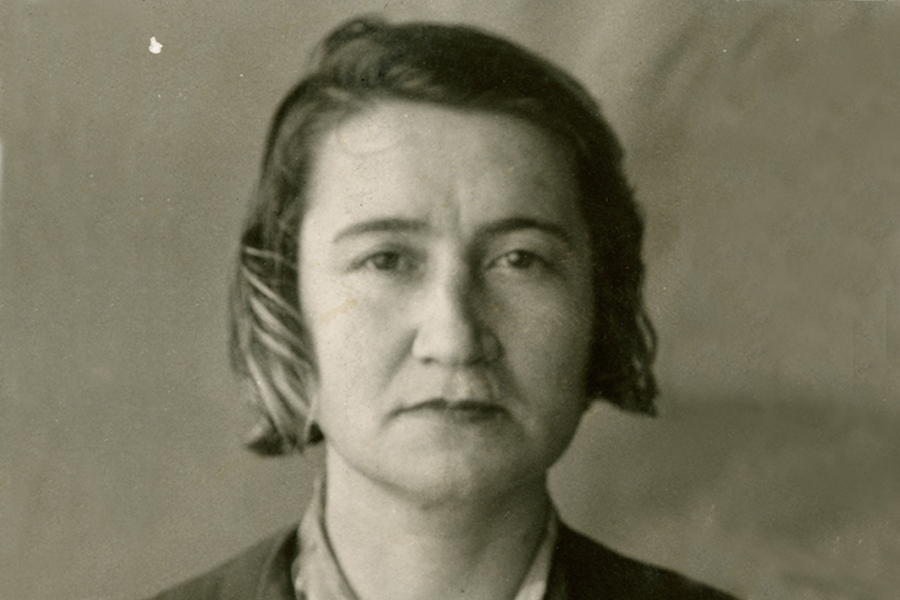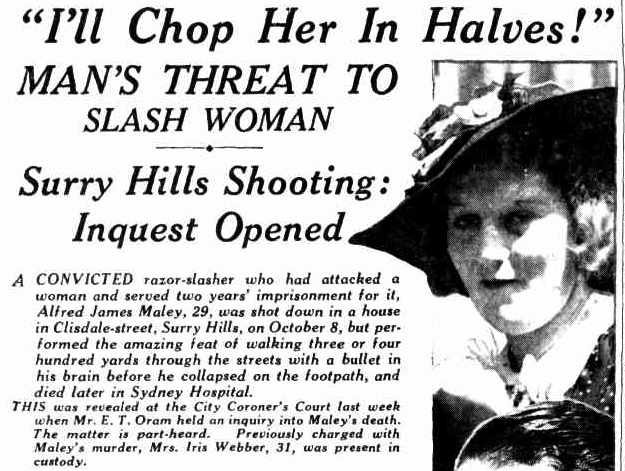
Iris Webber mugshot. State Records NSW via UTS Newsroom
When you think of Sydney’s dangerous crime queens of the 1920s-30s, the names Tilly Devine and Kate Leigh might come to mind. But there was another woman who earned a reputation as ‘the most violent woman in Sydney’. Her name was Iris Webber – a petty thief and sly grog seller who allegedly carried a knuckleduster and became famous for her dramatic courtroom appearances. I spoke with Nic Healey on 2SER Breakfast about Fiona McGregor’s fascinating new article in the Dictionary of Sydney.
Iris Eileen Mary Shingles was born in Bathurst in 1906. She married Edwin Webber in Warwick, Queensland in 1925. In 1932, Iris Webber was placed on remand for two and half months after she shot her husband in the buttocks with her pea rifle. She was acquitted because her husband refused to testify.
By 1933, Iris was living in Glebe and two years later in Surry Hills, at the time described as a ‘locality frequented by drinkers of methylated spirits and criminals of the worst type’. Just minutes from her abode was the beerhouse of the sly grog queen, Kate Leigh, and even closer lived gangster Bill Smillie, who had served five years in prison for a vicious slashing while working for Kate Leigh. Next door was Kathleen McLennan and her close friend, the prostitute Maisie Matthews, who became Iris’s lover.
Bill Smillie, who was also romantically linked with Matthews, was found bleeding on Elizabeth Street one night. He had been shot in each thigh with a repeating rifle owned by Iris. Though McLennan claimed responsibility, claims arose after the case collapsed that the assailant was actually Iris. In the end, Smillie refused to testify; humiliated, he claimed he was shot by a man.

News report about the Alfred (Slim) Maley murder, includes a photograph of Maisie Matthews, Truth, 24 October 1937. National Library of Australia – Trove
In 1936 Iris spent time at the State Reformatory for Women in Long Bay for minor charges. The following year she was charged for the murder of Alfred (Slim) Maley, another lover of Matthews. Again, Iris used a pea rifle, but was acquitted after spending six weeks on remand.
From 1938 Iris was arrested five times for busking, and in 1940 she was placed on remand for a mugging and spent over a year in gaol for assault. After that point, she sacked her lawyer and began conducting her own legal defence developing an aptitude for legalese. She was described by the pioneering policewoman, Lilian Armfield, as having a ‘brilliant brain’.
During the early 1940s, Iris was selling sly-grog from her house in Woolloomooloo and was raided eight times in six months. She was placed on remand for assaulting Jackie Hodder, a standover man and feared street fighter. Hodder had gone to Iris’s house to extort her before she attacked him with a tomahawk. Hodder withdrew the charges, yet another of Iris’s victims to claim he was attacked by a man.
After this incident, Iris married 65-year-old labourer George Furlong, perhaps to avert attention from her sexuality, something the police had noted, saying she was ‘practising the perversion on lesbianism’. While in gaol for selling sly grog, she filed for a divorce and after her release, she was back in Woolloomooloo with her new lover, Vera May Sariwee. They were both embroiled in a court case; Iris was charged with assaulting a men with a tomahawk while her lover, Vera, attacked his friend. They were both acquitted as the men did not turn up to give evidence.
In her final years, Iris was considered one of the personalities of Sydney. Her dramatic and successful courtroom appearances, accordion playing, violent streak and the fact that she was openly lesbian, secured her notoriety. Her last recorded conviction was in 1952 for contempt of court, after which she died a year later.
Listen to my segment at 2SER radio. For other interesting segments, see my Dictionary of Sydney project post and visit the Dictionary of Sydney blog.
